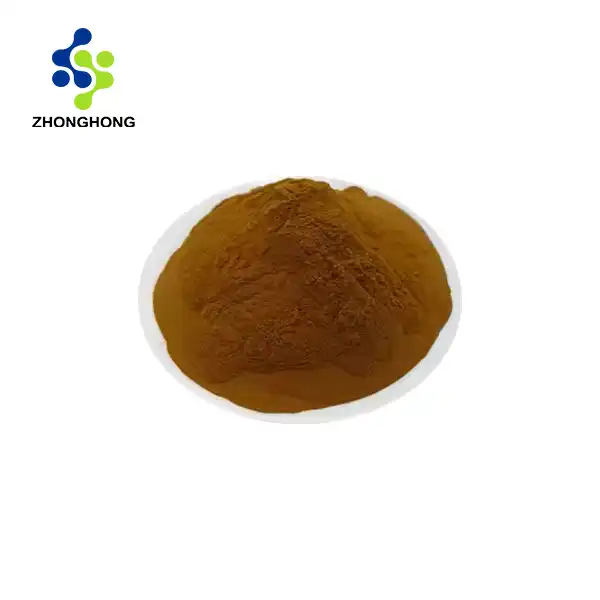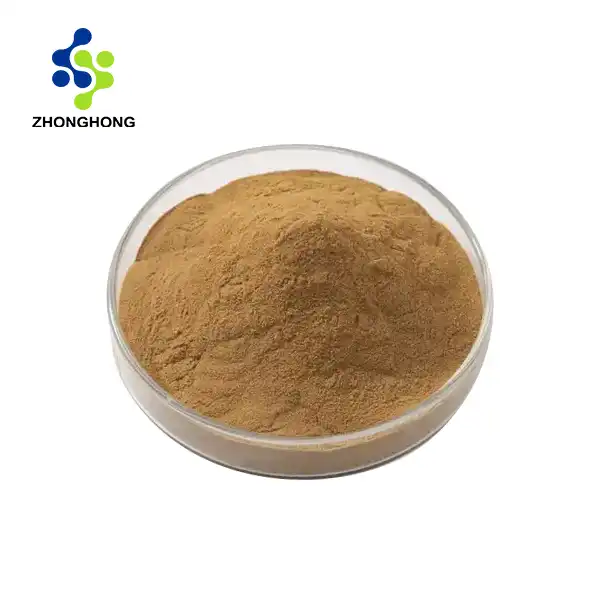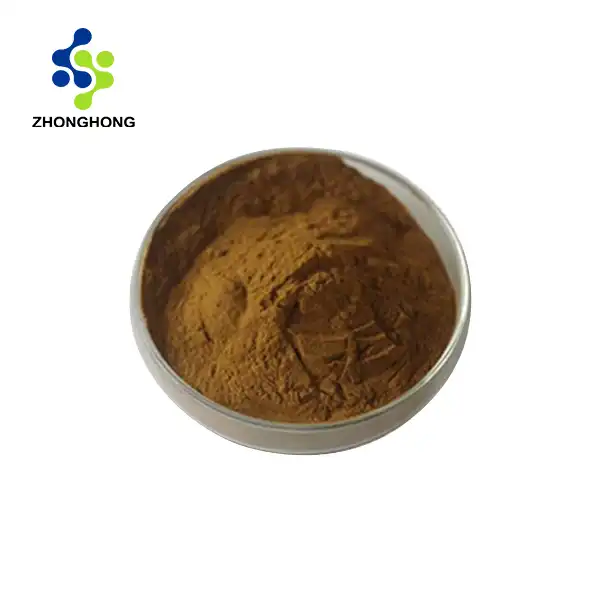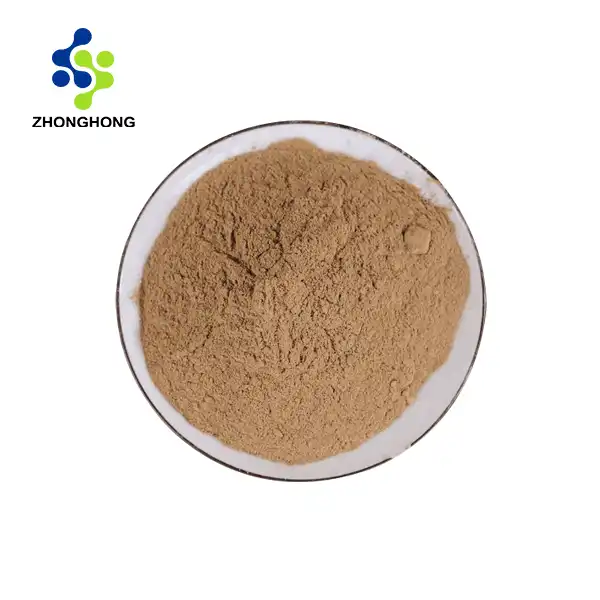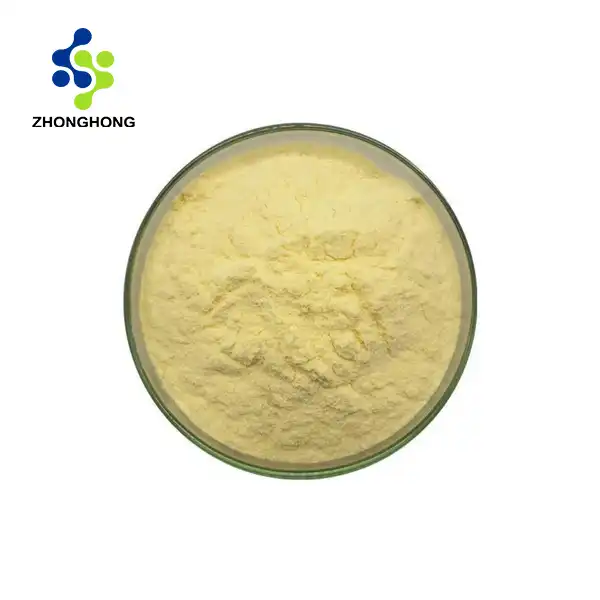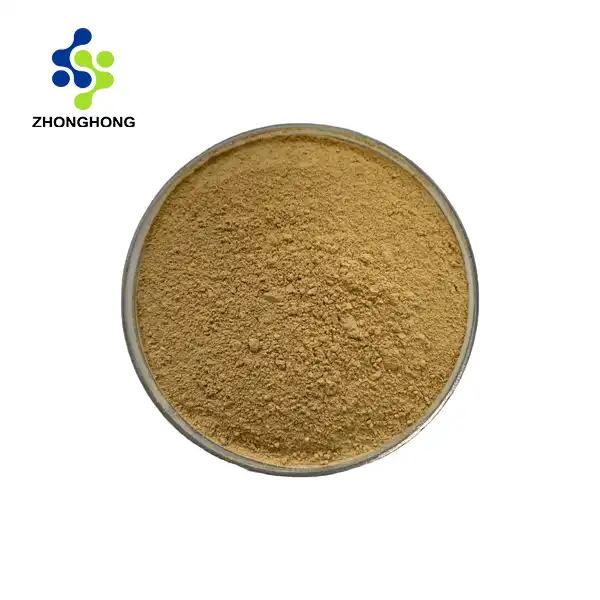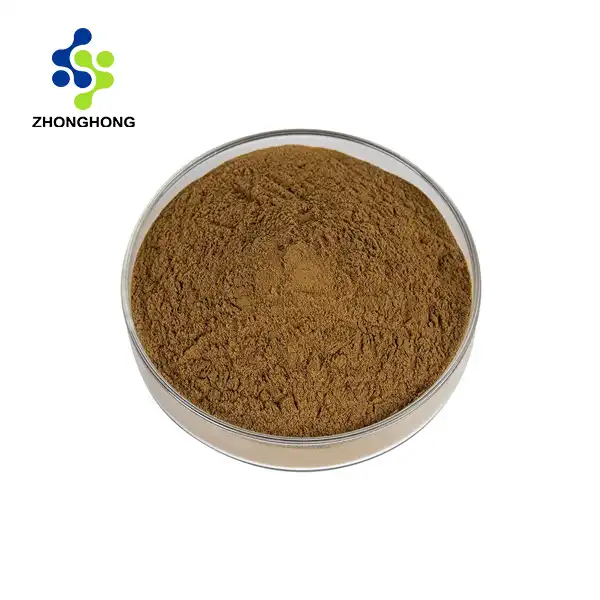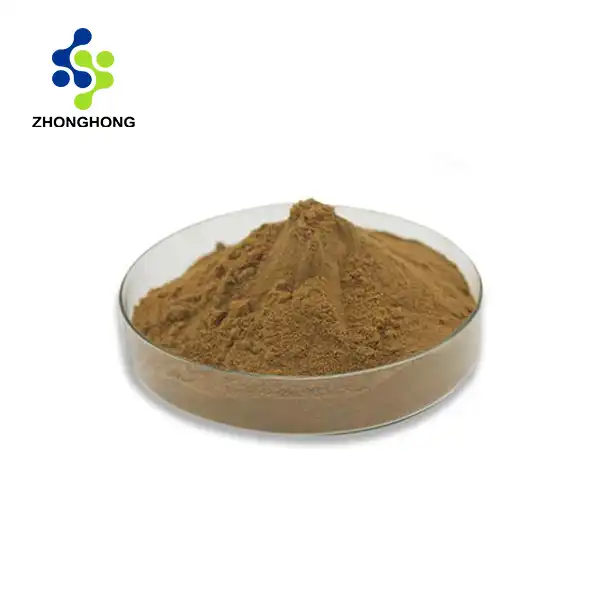Pygeum Africanum Extract: Natural Solution for Wellness
2024-11-30 17:31:31
In the realm of natural health solutions, Pygeum africanum extract has emerged as a potent ally for those seeking holistic wellness. This powerful botanical extract, derived from the bark of the African cherry tree, has been utilized for centuries in traditional medicine practices. Today, it's gaining recognition in modern health circles for its potential benefits, particularly in supporting urinary and prostate health.
What Is Pygeum Africanum and How Does It Work?
Pygeum africanum, commonly known as the African cherry tree or African plum tree, is native to sub-Saharan Africa. The extract derived from its bark contains a complex mixture of compounds, including phytosterols, pentacyclic triterpenes, and ferulic acid esters. These bioactive components are believed to contribute to the extract's therapeutic effects.
The mechanism of action of Pygeum africanum extract is multifaceted. It's thought to work by:
- Reducing inflammation in the prostate gland
- Inhibiting the production of prostaglandins, which can contribute to prostate enlargement
- Decreasing prolactin levels, potentially helping to reduce prostate size
- Improving bladder function and urinary flow
These actions collectively contribute to its potential benefits for prostate and urinary health. However, it's important to note that while research is promising, more studies are needed to fully understand the extent of Pygeum's effects.
Pygeum Powder Benefits for Urinary Health
The use of Pygeum africanum extract powder has been associated with several potential benefits for urinary health. Let's explore some of these in detail:
Benign Prostatic Hyperplasia (BPH) Support
One of the most well-researched applications of Pygeum extract is in the management of benign prostatic hyperplasia (BPH), a non-cancerous enlargement of the prostate gland. Studies suggest that Pygeum may help alleviate symptoms associated with BPH, such as:
- Frequent urination, especially at night
- Difficulty starting or maintaining urination
- Weak urine stream
- Feeling of incomplete bladder emptying
By potentially reducing prostate inflammation and size, Pygeum extract may help improve these symptoms and enhance overall quality of life for men dealing with BPH.
Improved Urinary Flow
Pygeum extract has been shown to potentially improve urinary flow rates in some studies. This improvement may be due to its anti-inflammatory properties and its ability to relax smooth muscles in the bladder and urethra. Enhanced urinary flow can lead to more complete bladder emptying, reducing the risk of urinary tract infections and other complications.
Bladder Health Support
Beyond its effects on the prostate, Pygeum extract may also support overall bladder health. Some research suggests it may help strengthen the bladder muscles and improve bladder tone. This could potentially benefit individuals dealing with overactive bladder or urinary incontinence issues.
Prostate Cancer Prevention
While more research is needed in this area, some preliminary studies have suggested that Pygeum extract may have potential in prostate cancer prevention. Its anti-inflammatory properties and ability to modulate hormonal activity in the prostate gland may contribute to this potential benefit. However, it's crucial to note that Pygeum should not be considered a treatment for prostate cancer, and any concerns about prostate health should be discussed with a healthcare professional.
Kidney Health
Some traditional uses of Pygeum bark include supporting kidney health. While scientific evidence in this area is limited, the extract's potential to improve overall urinary system function may indirectly benefit kidney health by promoting better urine flow and reducing the risk of urinary tract infections.
How to Choose the Best Pygeum Africanum Extract?
When selecting a Pygeum africanum extract powder, several factors should be considered to ensure you're getting a high-quality product that will deliver the desired benefits:
Standardization
Look for products that are standardized to contain a specific percentage of active compounds. A common standardization is 13% total sterols. Standardization ensures consistency in potency and effectiveness across batches.
Extraction Method
The method used to extract the beneficial compounds from Pygeum bark can affect the quality of the final product. CO2 extraction is considered one of the cleanest and most effective methods, preserving the integrity of the active compounds without using harsh solvents.
Purity
Choose products that are free from unnecessary fillers, additives, or potential allergens. A pure Pygeum extract should contain only the extract itself and perhaps a small amount of a natural anti-caking agent.
Third-Party Testing
Reputable manufacturers will have their products tested by independent laboratories to verify purity, potency, and safety. Look for products that provide certificates of analysis or other documentation of third-party testing.
Sustainable Sourcing
Given that Pygeum africanum is a tree native to specific regions of Africa, it's important to choose products from companies that practice sustainable harvesting methods. This ensures the long-term availability of this valuable resource and supports ecological balance.
Form and Dosage
Pygeum extract is available in various forms, including capsules, tablets, and powder. The powder form offers versatility in dosing and can be easily incorporated into smoothies or other beverages. Typical dosages range from 100-200 mg per day, but it's essential to follow the manufacturer's recommendations or consult with a healthcare provider for personalized advice.
Reputation of the Manufacturer
Choose products from reputable manufacturers with a history of producing high-quality supplements. Research the company's background, manufacturing practices, and customer reviews to ensure you're getting a trustworthy product.
Complementary Ingredients
Some Pygeum products may be combined with other herbs or nutrients that support prostate and urinary health, such as saw palmetto or pumpkin seed extract. While these combinations can be beneficial, ensure that the Pygeum content is clearly specified and meets your needs.
By considering these factors, you can select a high-quality Pygeum africanum extract powder that aligns with your wellness goals. Remember, while Pygeum extract shows promise in supporting urinary and prostate health, it's not a substitute for professional medical advice or treatment. Always consult with a healthcare provider before starting any new supplement regimen, especially if you have existing health conditions or are taking medications.
Potential Side Effects and Precautions
While Pygeum africanum extract is generally considered safe for most people when used as directed, it's important to be aware of potential side effects and take necessary precautions:
- Gastrointestinal discomfort: Some individuals may experience mild stomach upset, nausea, or constipation.
- Headache: In rare cases, headaches have been reported.
- Allergic reactions: Those with allergies to cherry or plum should exercise caution.
- Interactions with medications: Pygeum may interact with certain medications, particularly those affecting hormone levels or blood clotting.
It's advisable to start with a lower dose and gradually increase to assess your tolerance. Pregnant or breastfeeding women should avoid Pygeum extract due to insufficient safety data. If you experience any adverse reactions, discontinue use and consult a healthcare professional.
Incorporating Pygeum Extract into Your Wellness Routine
Integrating Pygeum africanum extract powder into your daily wellness routine can be simple and effective. Here are some suggestions:
- Mix the recommended dose into your morning smoothie or protein shake
- Stir it into a glass of water or juice
- Add it to your favorite herbal tea blend
- Incorporate it into homemade energy balls or bars
Consistency is key when using natural supplements like Pygeum extract. Regular, long-term use is typically necessary to experience the full potential benefits. Keep a journal to track any changes in your urinary health or overall well-being as you incorporate Pygeum into your routine.
Conclusion
In conclusion, Pygeum africanum extract powder offers a natural approach to supporting urinary and prostate health. By choosing a high-quality product and using it consistently as part of a holistic wellness plan, you may experience improvements in urinary function and overall quality of life. Remember, natural remedies like Pygeum work best when combined with a healthy lifestyle, including a balanced diet, regular exercise, and adequate hydration. If you want to get more information about this product, you can contact us at liaodaohai@gmail.com.
References
1. Ishani, A., et al. (2000). Pygeum africanum for the treatment of patients with benign prostatic hyperplasia: a systematic review and quantitative meta-analysis. The American Journal of Medicine, 109(8), 654-664.
2. Wilt, T., et al. (2002). Pygeum africanum for benign prostatic hyperplasia. Cochrane Database of Systematic Reviews, (1).
3. Breza, J., et al. (1998). Efficacy and acceptability of tadenan (Pygeum africanum extract) in the treatment of benign prostatic hyperplasia (BPH): a multicentre trial in central Europe. Current Medical Research and Opinion, 14(3), 127-139.
4. Chatelain, C., et al. (1999). Comparison of once and twice daily dosage forms of Pygeum africanum extract in patients with benign prostatic hyperplasia: a randomized, double-blind study, with long-term open label extension. Urology, 54(3), 473-478.
5. Andro, M. C., & Riffaud, J. P. (1995). Pygeum africanum extract for the treatment of patients with benign prostatic hyperplasia: a review of 25 years of published experience. Current Therapeutic Research, 56(8), 796-817.
6. Levin, R. M., & Das, A. K. (2000). A scientific basis for the therapeutic effects of Pygeum africanum and Serenoa repens. Urological Research, 28(3), 201-209.
_1728976869676.webp)
